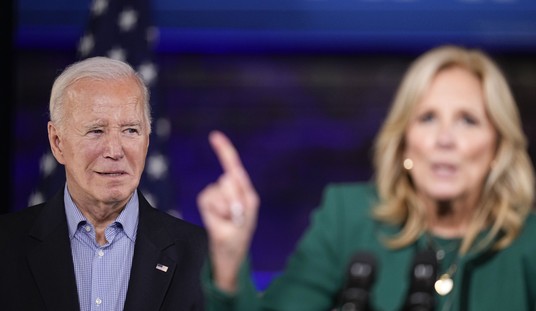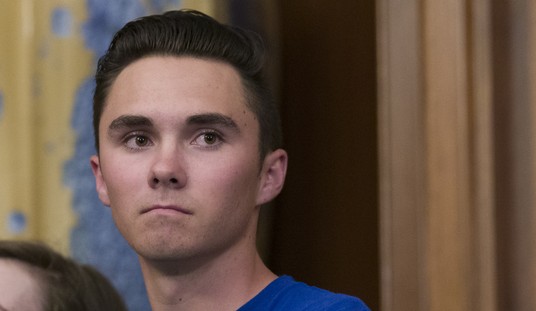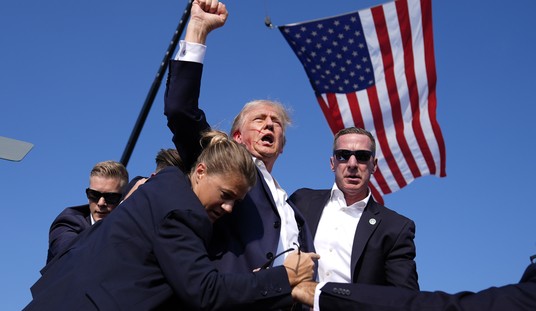Christopher Hitchens observed a few weeks ago that el Presidente Chávez, whom he had visited in 2008 along with Chávez’s close friend Sean Penn and whose antics he still follows, is barking mad. As Hitchens put it:
Chávez … is very close to the climactic moment when he will announce that he is a poached egg and that he requires a very large piece of buttered toast so that he can lie down and take a soothing nap.
Unfortunately, a nap is not what Chávez has in mind:
In a televised broadcast from the Miraflores presidential palace, Chavez spoke out against opposition leaders: “They will never enter here again, the immoral ones, the mobsters, the stateless ones, the traitors. I am going to say this until the last day of my life.”
In Venezuela, where Chávez is by no means alone in his dementia and lunacy does not augur defeat, insanity is more useful as an excuse for whatever happens than as valid predictor of the future. Even trying to figure out what happened can induce insanity.
Turnout was reasonably high, officially at 66.45% of Venezuela’s approximately 17,000,000 registered voters. “Small incidents” at a few polling places were “controlled,” according to the National Electoral Council, which stated: “This shows responsiveness not only of the CNE, but also of our Bolivarian Armed Forces and Plan República.” According to the attorney general: “The election was totally normal and was remarkably among the most successful ones in the Venezuelan history.” However, shortly after the close of the polls, opposition civil association Súmate said it received 911 complaints: 760 from voters, 114 from election witnesses, and 56 from poll workers. There were also various complaints of significant irregularities reported here, here, here, here, and elsewhere.
After a far longer delay in reporting than anticipated, the official preliminary results were reported at 3:30 a.m. EDT Monday. The president of the opposition alliance had stated earlier:
After all this time telling us that we have the most modern, most automated, most perfect election system in the world, and after they promised they would publish the results two hours following closure of polling sites, more than six hours have passed after the polls closed and results have not been announced.
We are waiting, because we do respect the law (which prevents publication of election results before the first official bulletin.) We know what happened, we already know what happened.
It seems likely that the official announcement of results had to be delayed until approved by el Presidente Chávez and that he was unhappy with them.
According to the official preliminary results, the Chavista party (PSUV) “won” at least 96 of 165 seats (58.2%) in the National Assembly. The PSUV previously had 139 seats (84.2%), with the rest held by various post-2005 breakaway leftist parties, including PPT and PODEMOS with six seats each. Chávez does not much like the breakaway parties, the “traitors, defenders of the empire and bourgeoisie.” The PSUV had a net loss of 43 seats.
The recently but only grudgingly united opposition parties (Unidos para Venezuela, with the unfortunate acronym MUD) got at least 61 seats (37%). Following the last election in 2005, which they boycotted, the opposition parties had no seats, so while the net gain of 61 seats is perhaps a bit less significant than might otherwise appear, it is not all that much less significant in view of the gross disparity between popular votes and seats obtained. However, as explained below, it should make a big difference.
The electorate had been thought more or less evenly distributed. According to the official preliminary results, the PSUV got 5,222,364 votes and the MUD got 5,054,114, a difference of 168,250 votes (1.64%). According to MUD, its candidates got 52% of the popular vote.
[Changes] to the electoral system rammed through by the government meant that a narrow popular vote lead is enough to give the PSUV a landslide victory. The changes abolish proportional representation, even though it is written into the 1999 constitution. And poorer, rural states where Mr. Chávez has more support will be significantly over-represented in the new assembly.
The districts more heavily supportive of Chávez also have more seats, for that reason.
Although Chávez got a majority of the seats, he did not achieve the two-thirds super majority needed to pass special enabling legislation “to appoint and remove, at will, the justices of the Supreme Tribunal of Justice, the Comptroller, the Prosecutor General, and the Ombudsman.”
The opposition parties were unhappy but not crying:
Opposition leaders celebrated at the coalition’s headquarters in Caracas, where they hugged and kissed each other amid smiling supporters.
In the western state of Zulia, where the opposition won 12 of the 15 posts up for grabs, Gov. Pablo Perez attributed the opposition’s gains to the coalition’s decision to field a single candidate for each of the 165 seats being contested.
It was not quite the knockout win Chávez sought, but better than he should have done in view of the widespread problems of crime, food shortage, inflation, and corruption, as well as water and electricity problems. The reported results are not extremely far off from those projected (69 MUD seats, 96 PSUV seats) on September 19 by Daniel Duquenal, a blogger in Venezuela, based to some extent on a “rosy scenario.” On September 23, he wrote a very sad article on what seemed likely to happen, noting that:
[Since] February 2009 I have slowly but surely come to grasp that the real problem is that Venezuelans are not democrats and in fact probably never were, except maybe briefly, for a few weeks at most, sometime after the Revolución de Octubre. And they probably never acted as democrats except during the regime of Medina and perhaps up to a point under the presidency of Leoni and the first weeks of the Caldera first term. All the rest of our independent history, that is roughly 96.37%, we have been looking for the Cacique [Big Chief] who will tell us what to do to make out like a bandit.
Notwithstanding the high turnout, some who oppose Chávez may not have bothered to vote — they knew the fix was in and could see no point in risking governmental retribution. Some nominal Chávez supporters may also have abstained. Calling Venezuela a democracy no more makes it one than calling a donkey an elephant changes its appearance or behavior.
Were otherwise apathetic folks stimulated by fear, Chávez’s largess, or otherwise to vote for the PSUV? As noted here, goodies promoted by Chávez/PSUV have included: the “Good Life” credit card, allowing consumers to buy food and other items including electronic household goods in state-run stores; a program for distributing cars operating on natural gas and carrying a guarantee of free maintenance; supermarkets previously taken over by the state offering subsidized food; and the sale of imported electronic devices at below-market prices. Chávez has not been shy about it. A recent broadcast from the presidential palace:
Looked like a 1950s TV commercial: an avuncular man in a shiny kitchen explaining to a housewife the wonders of a new fridge. “Feel the lines on it. Nice, eh? And wait till I tell you about the discount.”
…
In the mock kitchen Chávez, 56, a TV natural, flirted with the housewife, commended the Chinese ambassador, who hovered nearby, and addressed viewers directly as he patted the fridge. Capitalist rip-off merchants were cheating the people, he said, but socialism would fix that. “The Chávez price isn’t even $450, no … It’s $341!” An off-screen audience broke into applause and cheers.
Chávez didn’t say this, but perhaps should have:
It chops, minces, slices and dices with just a tap. Get the Chávez Quick Chop now! Just $1.00 per month for [garble] months with your Good Life credit card! There’s even a free lottery ticket, with the grand prize: a breast enhancement! Buy now and you may be the next Miss Venezuela!
The breast enhancement idea would not be new, as one candidate had already held such a lottery.
With 96 of the 165 seats (58.1 percent) in the National Assembly, Chávez may well be able to continue much of his increasingly impoverished and increasingly disliked march domestically toward perfection of his Bolivarian socialism.
Chávez’s decreasing impact internationally may continue regardless of the election outcome. It has had little if anything to do with his electoral legitimacy (he need only remain in power, and in many respects he has) and has depended on turning Venezuelan funds into hard currency and spending it externally. The Venezuelan economy is in shreds:
Inflation topped 25 percent last year despite government price controls on many foods and basic goods, and prices are already up 30.5 percent this year.
The government expects inflation to slow next year, and the opposition expects it to rise to 40 percent this year.
Unlike Cuba, Venezuela has vast natural resources useful to China, Russia, Iran, and other less than friendly countries with substantial power. In addition to lots of oil, Venezuela has natural gas and bauxite and (if she ever manages to get her electricity problems sorted out) the resources needed to make lots of aluminum. She also has iron ore, diamonds, and gold. China has increased her investments in Venezuelan natural resource exploitation substantially, promising twenty billion dollars for 2010. It seems more likely that China is doing this for strategic rather than for ideological or humanitarian reasons, but the economic benefits may help Chavez to continue to have a voice in Latin American affairs — unless he decides to focus principally on improving his chances of reelection in 2012 and devotes most of them to domestic affairs. In any event, due to her natural resources, Venezuela and the rest of South and Central America could become foci of confrontation in any future war. Even if that doesn’t happen, Venezuela has at least until recently been successful in getting allies to export her revolution:
Like Cuba, Venezuela may not have the economic heft to back up its revolutionary zeal, but it is finding useful friends of the revolution in China. In this time of need, Venezuela’s challenge lies in finding allies willing to cross the threshold from economic partner to strategic patron.
However, it has been suggested that Cuba has been changing and possibly making necessary strides away from communism. She is encouraging at least a limited private economic sector, particularly small business, and has announced that five hundred thousand government employees are being let go and that she will, “starting in October, issue 250,000 licenses for self-employment to help create private sector jobs for them.” The government workers being fired amount to roughly ten percent of the government workforce. Guess who said this (hint — it was a Cuban):
Without a sound and dynamic economy and without eliminating superfluous expenses and waste, it will not be possible to raise the living standard of the population nor preserve and improve the high levels of education and health care guaranteed to every citizen free of charge.
Without an efficient and robust agriculture that we can develop with the resources available to us — without dreaming of the large allocations of the past — we can’t hope to maintain and increase the amount of food for the population, instead of depending so much on importing products that could be grown in Cuba.
Without people feeling the need to work to be able to live — if they are protected by excessively paternalistic and irrational state regulations — we will never be able to encourage the love of work or solve the chronic shortage of construction, farm, and industrial workers; teachers; police; and other indispensable trades that little by little have been disappearing.
…
If we keep inflated payrolls in nearly every field of national life and pay wages that have no connection to results, increasing the amount of money in circulation, we cannot expect that prices will stop their constant climb, which reduces people’s purchasing power. We know that government departments and government-funded enterprises have hundreds of thousands of workers in excess; some analysts estimate that there are more than one million excess positions. This is a very sensitive issue that we should face firmly and with political sense.
Weaning those who have “enjoyed” many generations of not feeling the need to work seems unlikely to happen anytime soon in Cuba, the United States, or elsewhere. So — was it said by President Obama Speaker Pelosi Sarah Palin? No, she could have but is not a Cuban. Nor was it a dissident languishing in one of Cuba’s luxurious prisons. It was Fidel’s brother, Cuban President Raul Castro, trying to put things in perspective during an address to the Ninth Congress of the Union of Young Communists (UJC) in Havana April 4.
Gosh darn! Is Raul looking for T.E.A. party support? Probably not. His words were published in The Militant, a Socialist weekly, to counter “capitalist lies” about the problems of communism. Nevertheless, it would be good were President Obama to say and to mean at least a few of these things.
Perhaps ironically, Cuba may, in at least some small way, be trying to push Venezuela away from her ties with Iran, without invoking the economic aspects of Raul’s somewhat tautological notion that “What works works; what doesn’t doesn’t.” Cuba could probably have an impact on Venezuela’s external relationships because Venezuela has largely become a symbiotic colony of Cuba. Cuba receives oil from Venezuela and has become intimately involved in most sectors of Venezuelan life, including education, health, the military, the police, mining, the internet, electricity generation and distribution, and agriculture.
As noted here, Castro recently stated:
[The] Iranian government should understand the consequences of theological anti-Semitism. “This went on for maybe two thousand years,” he said. “I don’t think anyone has been slandered more than the Jews. I would say much more than the Muslims. They have been slandered much more than the Muslims because they are blamed and slandered for everything. No one blames the Muslims for anything.” The Iranian government should understand that the Jews “were expelled from their land, persecuted and mistreated all over the world, as the ones who killed God. In my judgment here’s what happened to them: Reverse selection. What’s reverse selection? Over 2,000 years they were subjected to terrible persecution and then to the pogroms. One might have assumed that they would have disappeared; I think their culture and religion kept them together as a nation.” He continued: “The Jews have lived an existence that is much harder than ours. There is nothing that compares to the Holocaust.”
Moreover, it has been noted that:
Following Fidel’s uncharacteristically pro-Jewish remarks, Chavez, who has echoed his Iranian ally’s vituperative stance against Israel, held a meeting with leaders of Venezuela’s Jewish community on September 18 in which he reportedly discussed their concerns about anti-Semitic remarks in the media and their request for Venezuela to re-establish diplomatic relations with Israel.
This does not mean that either the Cuban or Venezuelan leopards are changing their stripes. They remain brutal dictatorships. However, Cuba may be trying to approach things more pragmatically.
What the United States can usefully do at this point is above my pay grade. It’s very likely above President Obama’s pay grade as well, even in the unlikely event that he wanted to do something useful for a change, and most likely nothing productive will be accomplished even though the dangers are lurking. Free trade agreements might be helpful, but in little more than a cosmetic sense. On balance, they would do little to help Pánama or Colombia, as to which FTAs have been held up for a very long time; Pánama and Colombia are doing just fine without them and don’t need the “reforms” upon the adoption of which approval by the United States has thus far been denied. Most of South America, with the notable exception of Venezuela, is further out of the current global recession than is the United States. Echoing some of the Castro brothers’ words might help, but is unlikely. Increased support for Colombia seems a good idea, and more support for Latin American countries not hostile to the United States does as well. We blew it in Honduras and that simply can’t be permitted to happen again.
If and to the extent that Cuba gradually rejects communism and diminishes its support for Iran, as there have been recent signs of, and also carries out significant human rights reforms, some carrots to help the process along would also make sense. Ditto Venezuela and the rest of Latin America. However, the United States has long been more supportive of regional stability than of democratic change favorable to United States interests, and I see very few signs that is about to change in the near future in Latin America, or elsewhere.









Join the conversation as a VIP Member